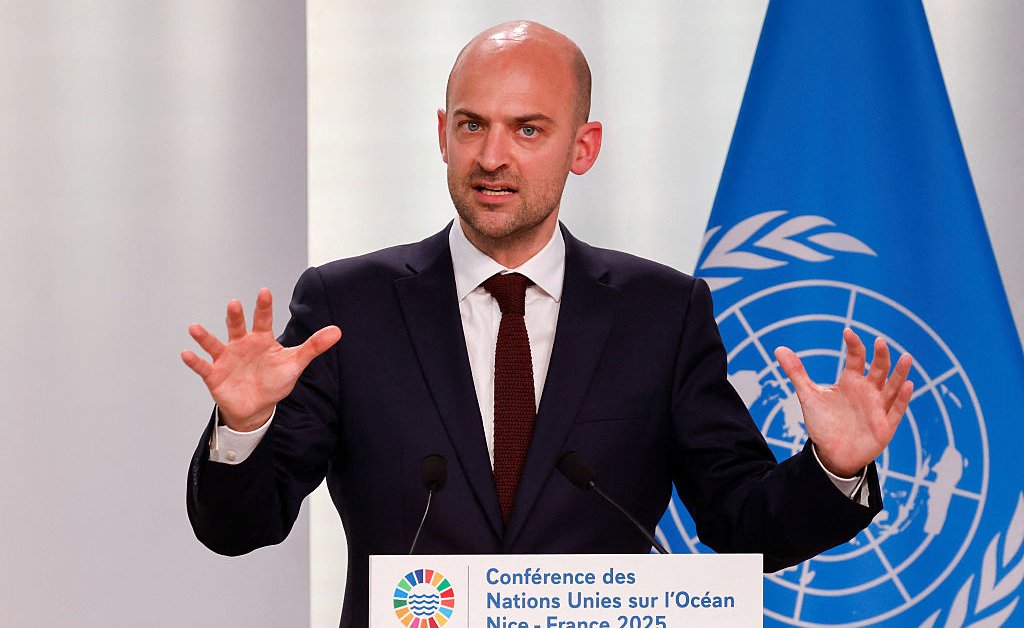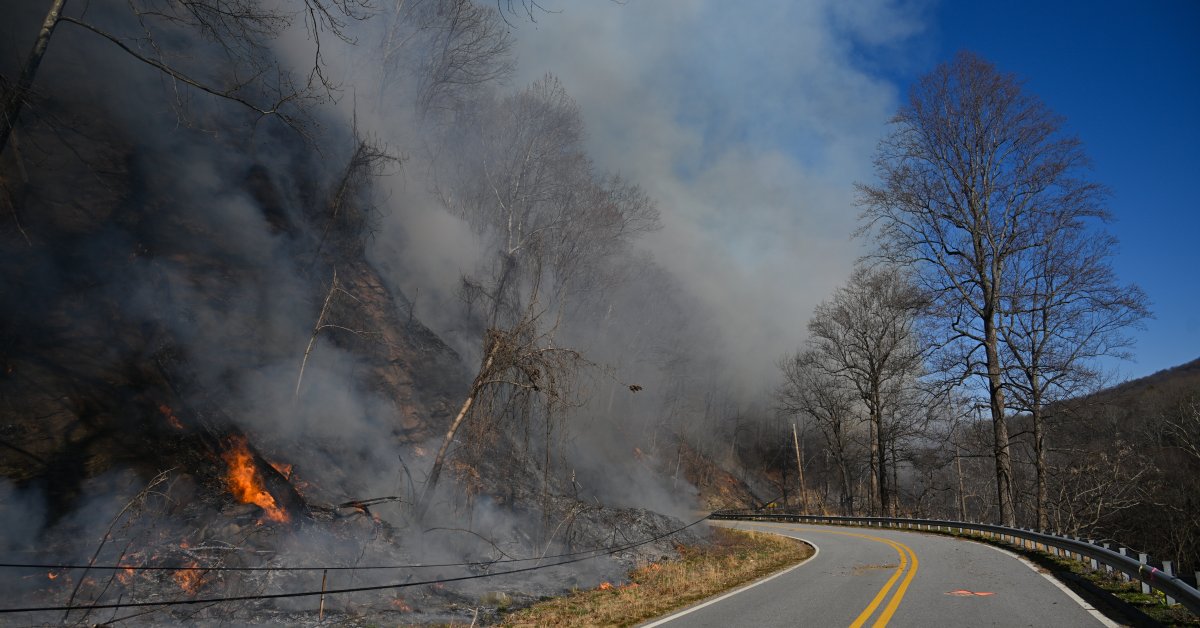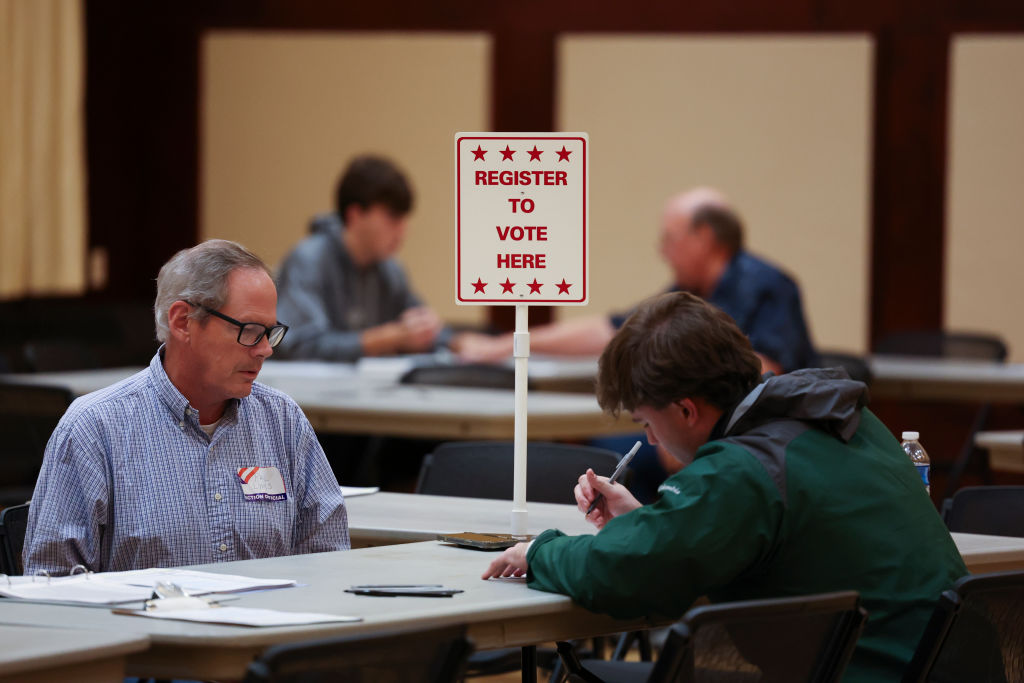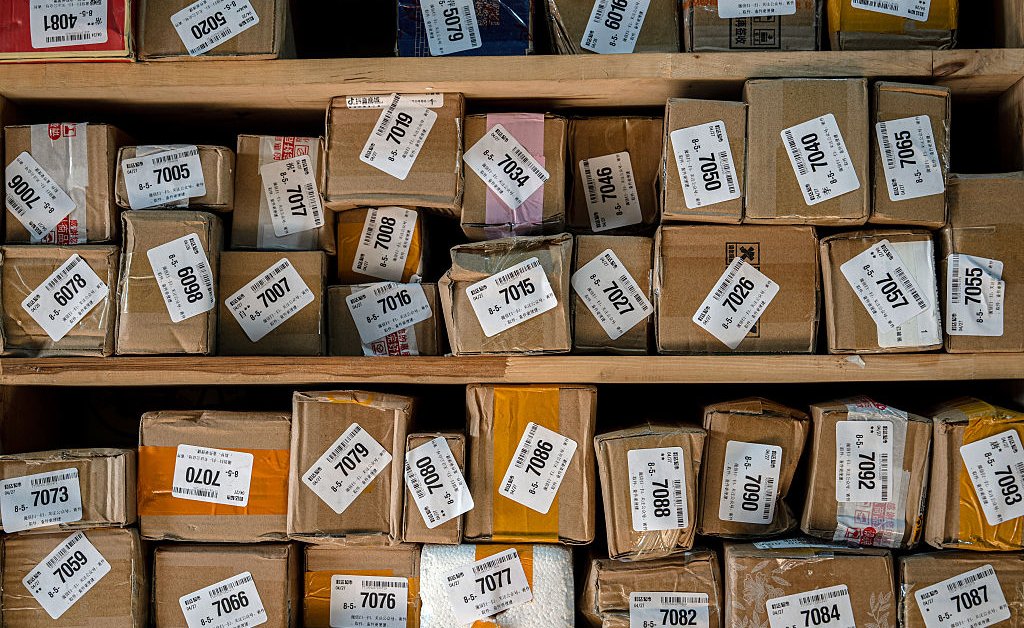When French President Emmanuel Macron appointed Jean-Noël Barrot last September as his new Minister for Europe and Foreign Affairs—the fourth during eight years in power—some feared the 42-year-old economist might be totally eclipsed by the country’s kinetic leader. Indeed, Macron has zipped furiously across Europe, the Middle East, and Asia all year, negotiating deals on climate, trade, military assistance, and peace, some of it in an effort to fill an aching vacuum left by Washington. For all that, Barrot, who spent a few years teaching at MIT, has emerged as a fervent voice for his boss’s agenda, attempting to give the world a global-minded alternative to an increasingly inward-looking U.S.
This week, that contrast is on stark display in the sun-baked Provence city of Nice, where thousands are gathered for the U.N.’s Oceans Conference. The hope is that after five days of talks and speeches, nations will agree to international controls on fishing, deep-sea mining, wildlife conservation, and other issues, in order to stanch the rapid degradation of oceans, crucial to reining in global warming. Delegations of top government officials, presidents, and prime ministers from about 170 countries are among the crowds. Absent: The U.S.
At the end of the hectic opening day on Monday, Barrot sat down with TIME to reflect on the impact of a deeply changed global order, and what can be done.
TIME: The U.S. administration is not represented here. Did they decline the invitation, or did they never say whether they were coming?
Barrot: Everyone was invited. This is a U.N. conference, so any U.N. member country is invited to come. But I cannot help but notice that many U.S. organizations are present. We have U.S. scientists. We have the Mayor of New Orleans, the Mayor of New York, the Mayor of Los Angeles.
This is a really crucial global summit. Are you saying it doesn’t matter whether the U.S. takes itself out of the whole process? Because of course, it is not just the oceans.
One thing is true: Europe will never give up on multilateralism, on cooperation. We believe it is in the interest of mankind, but it’s also in our own interests.
We’re seeing many countries around the world, in Africa, in Latin America, in Southeast Asia, that are looking at France and Europe to resist. They’re looking at us and expecting us to resist the temptation by some to go back to confrontation, fears of coercion. And it is our intention to build coalitions whenever traditional multilateral forums are not effective, to show that there is only one way to solve the global issues we’re facing, the consequences of which are going to affect our daily lives, [which] is by multilateral means.
That feels a bit like you’re climbing uphill. You’ve got to put together a coalition, and build this multilateralism, without a key player involved.
No. What I’m saying is that we will defend multilateralism in all areas. We’re celebrating the 80th anniversary of the U.N. this year. They built those that came before us. They built a number of multilateral forums for trade, for security, for environment. We’re going to defend and support these. But at any point in time when they will not be able to deliver results, because some will oppose them from within, then we will find other ways for multilateral forums and cooperation to exist.
The key message is that everyone, every country in the world, is better off with an effective multilateralism. It is not because some countries in the world would like to give up on multilateralism, that we will give up. We will not.
This goes beyond oceans.
I’m thinking of international trade, of security, of the security architecture coming out of the Second World War, starting with the U.N. Charter that basically says that there is never any pretext for violence and brute force, except for self defense, and except when the Security Council prescribes it.
We’re seeing these basic principles—that you don’t touch my borders and I will not touch yours—being violated.
You mean Ukraine?
Yes, and other places in the world. We are seeing the Non-Proliferation Treaty being questioned by some countries that are basically close to acquiring nuclear weapons and creating massive instability.
I could mention other global goods, such as health, with the World Health Organization.
So the whole architecture we’ve relied on for 80 years.
It is weakened. It is going to have to be something new. That is why we’re pleading in favor of reform of the Security Council at the U.N., to allow India, Brazil, Germany, Japan, and two African countries to become permanent members. [Since 1945 only the U.S., Britain, France, China, and Russia have been permanent members of the Security Council, holding veto power on votes at the U.N.]
If we want international law and multilateral principles to be stronger, we need the institutions to be more representative and legitimate.
People have been calling for this for a long time, and it’s never happened. Do you see an opportunity now, given what terrible shape multilateralism is in?
I think history is accelerating. And for all those who believe in this legacy that came out of the ruins of the Second World War, and that feel responsible for transferring to the next generation the global architecture that does not prevent all countries from having anything bad happen, that has prevented so many of these things over the past decades—if we want this to survive, it’s time to act.
There are two wars that seem to have no end date. How do you see this ending in Ukraine and in Gaza?
So in Gaza, we are calling for an immediate ceasefire. Liberation of hostages held by Hamas and unhindered access of humanitarian help to Gaza.
But then, the only alternative to a permanent state of war is a political solution resting on two states living side by side with security guarantees. This is what we’re working on in the perspective of the conference that will be taking place in a few days [a U.N. conference in New York on June 18], removing all the obstacles on the path towards such a political solution, because we believe it to be in the interests of the Israeli people, of the Palestinian people—and therefore, in our interests as well, as Europeans.
For Ukraine, we need Vladimir Putin to cease fire and to agree to enter into peace negotiations that will comply with the principles of the U.N. Charter.
Since he doesn’t seem to be sending any signal that he’s willing to do that, we’re going to build up significant pressure, by coordinating with the efforts led by the U.S. senators to adopt in the next few days a new package of sanctions, targeted to force Putin, allowing for peace negotiation to start.
And military security guarantees from Europe too?
We need a ceasefire for discussions to start, and then, of course, those discussions will have [to] come to the question of territories and security guarantees.
You think you could go ahead without the U.S., or you think that the U.S. will finally come on board?
The most important point is for Ukraine to be able to deter any further aggression. This starts with strengthening their own army. A strong army is in itself a powerful deterrent. There are various possible formulas and scenarios that I don’t want to present here, some of which indeed include some form of contribution by the U.S.
Getting back to the oceans: President Macron told the conference the oceans ‘are not for sale.’ Everyone, myself included, understood that to refer to President Trump’s executive order allowing deep-sea mining.
On this, there’s no surprise. We’ve brought together a coalition of more than 30 countries that request a moratorium, or at the very least to apply a precautionary principle to the exploitation of deep seas, and that supports international efforts by the International Seabed Authority to draft a mining code. So it’s no surprise [that] when we’ve seen recent decisions allowing exploitation of the seabed that we would voice our opposition. We’re saying it today and we’ll say it in the future.
But what do you do if the U.S. simply goes ahead and effectively violates international law? What’s your recourse?
Our mission here in Nice is to highlight the risks of indulging in such seabed exploitation without first taking the time to explore its resources and draft legislation that is going to preserve the resources of the ocean and allow for economic activity with and from the ocean. That’s the only way to make such sort of ocean-based economic activity acceptable and sustainable.
Do you have international law to enforce that? I mean, at the moment, the enforcement mechanism is a little bit lacking.
No. The International Seabed Authority is in the process of drafting a mining code. We support this effort. As far as the high seas is concerned, there is absolutely no regulation. This Treaty on the High Seas [a U.N.-negotiated document which several countries are ratifying in Nice this week] is going to initiate the process. It is going to end up with regulation of 50% of the planet [the oceans] that is subject to absolutely no law, nor any regulation.
That adds to various announcements regarding marine protected areas, decarbonization of transportation, the creation of an international organization for the science of the ocean, and the creation of a global coalition of cities and regions. The world is basically taking its destiny in its hands and acting for the ocean.
But not the U.S.?
Everywhere I’m walking in Nice I am seeing the presence of U.S. scientists, U.S. mayors.
We still have some work to do to keep raising awareness, so that everyone around the world understands that there is only one ocean, and that our future is pretty much — very much — connected to it.
If we don’t act with resolution, the ocean that is our friend and ally can also become an adversary, especially for countries that have coastlines that are exposed to the rising sea levels.
This is the biggest ever conference organized on the ocean. We had 4,000 people in 2017 in New York [the first U.N. Oceans Conference], 7,000 in Lisbon in 2022, and over 100,000 people in Nice.
President Macron is going to Greenland this weekend. Why?
Greenland is European territory. He will be there with the Prime Minister of Denmark. We’ve been saying repeatedly that European borders are not negotiable. So it’s a way to reaffirm this principle, but also to strengthen our cooperation with Greenland. We intend to enhance those links, from scientific cooperation to economic cooperation.
Is it a message to the U.S. president too?
I think it’s more of a message to Greenland. And the testament to our friendship as well.








